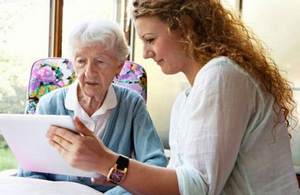Health Secretary outlines vision for use of technology across NHS
Patients will be able to access and interact with their GP record online within 12 months, Jeremy Hunt announced today.

Patients looking at laptop
Speaking at the NHS Innovation Expo in Manchester, the Health Secretary challenged the NHS to make better use of technology so that patients can be empowered to manage their own healthcare needs, while ensuring that their data remains safe at all times.
Mr Hunt made clear that by 2016 all patients should be able to access their own GP electronic record online in full, seeing not just a summary of their allergies and medication but blood test results, appointment records and medical histories. By 2018 this record will include information from all their health and care interactions.
Mr Hunt said:
Powerful patients need to know about the quality of healthcare being provided, but they also need to be able to harness the many innovations now becoming possible.
To most of us it feels like there has been more change in the way we book taxis, shop, bank or store photos than the way we access healthcare. Yet for every single one of us healthcare is more important than all of those things.
Experience from other countries suggests that opening up access to your own medical record leads to a profound change in culture in a way that is transformative for people with complex or long term conditions.
In the UK, 84% of the population use the internet, 59% use a smartphone but only 2% have had any digital interaction with the NHS.
The Health Secretary stated his ambition to get a quarter of smartphone users – 15% of all NHS patients – routinely accessing NHS advice, services and medical records through apps by the end of the next financial year.
Mr Hunt said:
I also want patients not just to be able to read their medical record on their smartphone but to add to it, whether by recording their own comments or by plugging in their own wearable devices to it.
In addition, by the end of 2018 all doctors and nurses will be able to access the most up-to-date lifesaving information across GP surgeries, ambulance services and A&E departments, no matter where a patient is in England. By 2020 this will include the social care system as well.
Mr Hunt added:
As the internet drives forward the next wave of innovation, all over the world healthcare still seems to be at the back of the queue.
We will only really be putting patients first if we can give them confidence that every part of the system knows their care plan, is up to date with their progress and doesn’t need them to repeat their story time after time.
We no longer have to carry round our cheque books or boarding passes, and we shouldn’t accept any less when it comes to our health.
As the use of technology increases, so does the need to reassure the public that their personal medical data is being held securely.
Mr Hunt said:
Exciting though this all is, we will throw away these opportunities if the public do not believe they can trust us to look after their personal medical data securely.
The NHS has not yet won the public’s trust in an area that is vital for the future of patient care.
Nothing matters more to us than our health, and people rightly say we must be able to assure the security of confidential medical information.
The Health Secretary announced a number of measures to assure the security of confidential medical information during his speech.
This will include a review of standards of data security for patients’ confidential data across the NHS to be carried out by the Care Quality Commission (CQC).
18 September 2015 - clarification of Dame Fiona Caldicott’s contribution to the review
The National Data Guardian for health and care, Dame Fiona Caldicott, will contribute to this review by developing clear guidelines for the protection of personal data against which every NHS and care organisation will be held to account. She will provide advice on the wording for a new model of consents and opt-outs, to enable patients to make an informed decision about how their data will be shared.
The work will be completed in January with recommendations on how the new guidelines can be assured through CQC inspections and NHS England commissioning processes.
The independent oversight provided by Dame Fiona will also be strengthened. Her role will be put on a statutory footing – similar to the role of the Chief Inspector of Hospitals – and the government will consult over the autumn on the best way to do that.